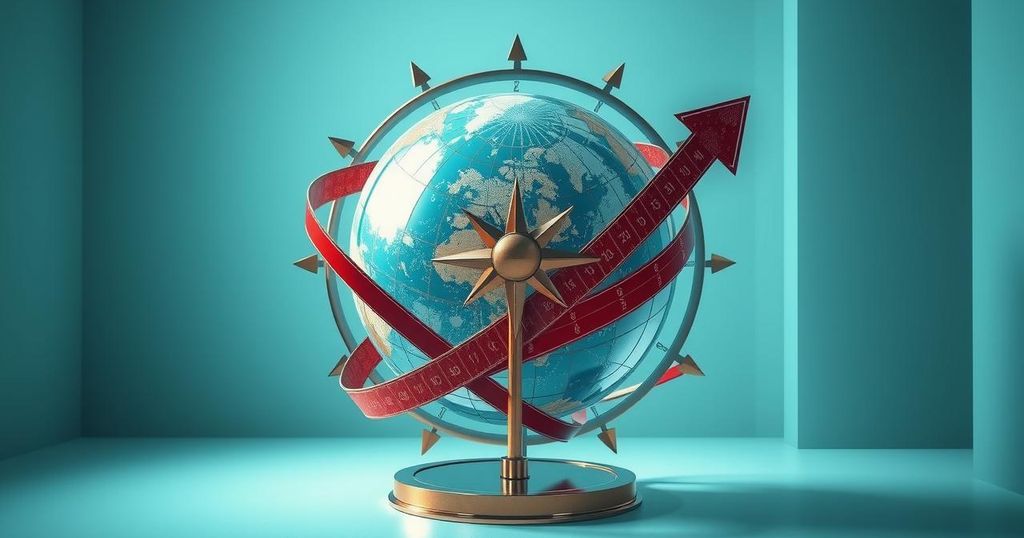Shifting Global Dynamics: Xi Jinping, Putin, and Trump’s Impact on Geopolitics
Xi Jinping and Vladimir Putin have solidified their alliance since the ‘no-limits’ partnership declared before Russia’s invasion of Ukraine in 2022. Under President Trump, the U.S. has engaged with Russia, raising questions about potential fractures in the China-Russia relationship. Meanwhile, China seeks to enhance its diplomatic influence globally while dealing with suspicions regarding its support for Russia amidst ongoing dynamics concerning Taiwan.
In recent years, two prominent figures on the global stage, Xi Jinping of China and Vladimir Putin of Russia, have publicly expressed their close relationship. Their partnership was notably proclaimed as a “no-limits” alliance just before Russia’s major invasion of Ukraine in 2022. Despite opportunities for Xi to distance himself from Putin’s expansionist actions, their alliance has only grown stronger through continued communication, raising concerns in the West about a potential split between Moscow and Beijing amid shifts in U.S. foreign policy.
With the recent warming of relations between Russia and the United States under President Donald Trump, analysts speculate whether this is an attempt by the U.S. to weaken China’s influence. Trump’s administration has engaged directly with Putin, discussing issues such as the Ukrainian conflict without Ukrainian representatives present. Such dynamics have led experts to predict that Xi could see the current geopolitical climate as advantageous, particularly regarding China’s ambitions in Taiwan.
As both leaders discussed their cooperative efforts on the anniversary of the Ukraine war, Xi emphasized the resilience and autonomy of their bond. He proclaimed that their relationship would progress independently of external pressures, specifically mentioning the United States. Observers like Wen-Ti Sung suggest that dismantling the China-Russia alliance would demand a significant ideological shift from the U.S., a prospect deemed unlikely.
China has been working to position itself as a major diplomatic force, aspiring not to just economic dominance but also global arbitership. Its successful mediation between Iran and Saudi Arabia exemplifies this ambition. Regarding Ukraine, Xi has offered peace proposals, though China’s actions have raised suspicions in Kyiv and Washington about its military support for Russia.
While China denies complicity in boosting Russia’s military capabilities, it continues to engage in substantial trade, particularly in natural gas. Recent Chinese naval movements near Australia reflect a strategy to gauge reactions from regional allies. Analysts interpret this as an attempt to measure the strength of U.S. alliances amid the new Trump administration’s foreign policy.
Trump’s aggressive rhetoric towards China and Taiwan complicates future dynamics, with prominent officials taking hardline stances on U.S.-China relations. Changes in language on government websites regarding Taiwan have provoked Beijing’s ire while aiming to bolster reassurance in Taiwan itself. There remains a delicate interplay of power balance, complicating projections for both escalation and diplomacy in the Asia-Pacific region.
The ongoing geopolitical landscape requires vigilance from Taiwan as it navigates its role amid U.S. policy shifts. Relations with the United States are vital for Taiwan’s security, but the country’s need to present itself as an asset to the U.S. is increasingly urgent in light of recent events. In conclusion, the interplay between these global relationships will significantly shape the future geopolitical scene in the context of U.S.-China-Russia dynamics.
The evolving relationships between Xi Jinping, Vladimir Putin, and Donald Trump underline a complicated geopolitical landscape. While Xi and Putin strengthen their partnership, the U.S. aims to reassert its influence, particularly regarding Taiwan. Amid these developments, Taiwan faces the imperative to affirm its significance as a partner to the West. Therefore, careful observation of these interactions is crucial for anticipating future tensions and cooperative endeavors.
Original Source: www.abc.net.au




Post Comment